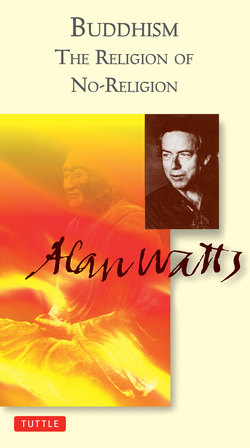Читать книгу Buddhism the Religion of No-Religion - Alan Watts - Страница 10
На сайте Литреса книга снята с продажи.
ОглавлениеTHE MIDDLE WAY
CHAPTER TWO
I want to emphasize that the religions of the Far East—Hinduism, Buddhism, and Taoism—do not require a belief in anything specific. They do not require obedience to commandments from above, and they do not require conformity to any specific rituals. Their objective is not ideas or doctrines, but rather a method for the transformation of consciousness, and our sensation of self.
I emphasize the word sensation because it is the strongest word we have for direct feeling. When you put your hand on the corner of a table you have a very definite feeling, and when you are aware of existing, you also have a definite feeling. But in the view of the methods or disciplines of the East, our ordinary feeling of who we are and how we exist is a hallucination. To feel oneself as a separate ego, a source of action and awareness entirely separate and independent from the rest of the world, locked up inside a bag of skin, is in the view of the East a hallucination. You are not a stranger on the earth who has come into this world as the result of a fluke of nature, or as a spirit from somewhere outside nature altogether. In your fundamental existence you are the total energy of this universe playing the game of being you. The fundamental game of the world is the game of hide-and-seek. The colossal reality, the unitary energy that is the universe, plays at being many: it manifests itself as all these particulars around us. This is the fundamental intuition of Hinduism, Buddhism, and Taoism.
Buddhism originated in northern India close to the area that is now Nepal, shortly after 600 B.C. A young prince by the name of Gautama Siddhartha became the man we call the Buddha. “Buddha” is a title based on the Sanskrit root budh, which means to be awake. A buddha is an individual who has awakened from the dream of life as we ordinarily take it to be and discovered who we truly are. This idea was not something new. There was already in the whole complex of Hinduism the idea of buddhas, of awakened people. Curiously, they are ranked higher than gods. According to the Hindus, even the gods or the angels—the devas—are still bound on the wheel of life, are still trapped within the rat race pursuit of success, pleasure, virtue (which originally meant strength), magical power, or other positives. They are under illusion—are bound to the wheel of life—because they still believe positive and negative are opposites and that either one can exist without the other. This is illusion. You only know what “to be” is by contrasting it with “not to be.” The front of a coin implies the existence of the back. If you try to gain the positive and escape the negative, it is as if you were trying to arrange everything in a room so that all of it was up and nothing was down. You cannot do it; you have set yourself an absolutely insoluble problem.
The basis of life is unity. Most people think of blue and red as being at opposite ends of the spectrum, but when they come together in the color purple, they actually complete a circle. Purple is the mixture of red and blue. Similarly, all sensations, all feelings, all experiences, occupy a point on a circle of sensations. Everyone is constantly operating through all the possible variations of experience. You cannot have one point on the circle without also knowing all the others. Even if you wanted to have only your favorite color, purple, you still have to have blue and red because without them you cannot have purple.
